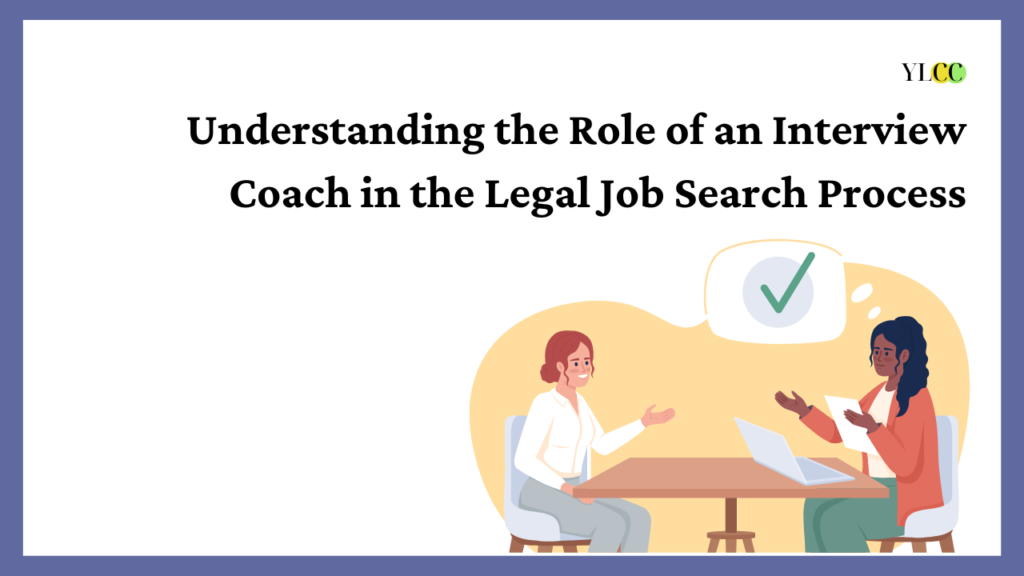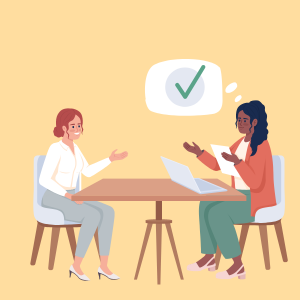
Welcome to the cutthroat world of the legal job search process! With so many highly qualified candidates competing for a limited number of positions, it’s no wonder that job seekers are feeling the pressure to stand out from the pack. The interview stage is where the real battle begins, as candidates have to put their best foot forward and convince potential employers that they are the perfect fit for the job. Fortunately, there is a secret weapon that can give candidates the edge they need – interview coaching! In this article, we will delve into the crucial role of interview coaches in the legal job search process and discover why interview coaching is a game-changer for legal job seekers.
The Role of an Interview Coach in the Legal Job Search Process
In the legal job search process, an interview coach can be the secret weapon for job seekers looking to land their dream job. An interview coach provides a range of services, including:
- Resume and Cover Letter Review: An interview coach can help candidates showcase their skills and experience by providing feedback on their resume and cover letter.
- Mock Interviews: An interview coach can simulate an actual interview and provide feedback on the candidate’s responses, body language, and overall presentation.
- Interview Strategies: An interview coach can provide advice on the best strategies to use during an interview, such as how to answer common questions and how to address potential weaknesses.
- Confidence Boost: An interview coach can help job seekers feel more confident and prepared for interviews by providing positive feedback and encouragement.
Pre-Interview Preparation: The First Step to Landing Your Dream Legal Job
Before you walk into that interview room, it’s crucial to ensure you’ve prepared adequately. Here are some steps you can take to ensure you’re well-prepared:
- Identifying Strengths and Weaknesses: An interview coach can help you identify your strengths and weaknesses, enabling you to leverage the former and work on improving the latter. That way, you’ll be better equipped to answer any questions related to these areas during the interview.
- Developing a Personal Brand: Crafting a unique personal brand can set you apart from other legal job seekers. Your personal brand can include factors such as your professional image, experience, education, and skills, among others. An interview coach can help you identify what makes you stand out from the crowd and how to present your personal brand in the best light.
- Crafting an Effective Resume and Cover Letter: A well-crafted resume and cover letter can be the difference between landing an interview or not. An interview coach can help you develop a resume and cover letter that effectively showcases your skills and experience and aligns with the specific requirements of the legal job you’re applying for.
- Researching Potential Employers: Conducting research on potential employers can give you a significant advantage during the interview process. An interview coach can help you identify relevant information about potential employers, such as their values, culture, and recent developments, among other factors. Armed with this information, you’ll be better positioned to articulate how your skills and experience align with the organization’s goals and values.
By following these pre-interview preparation steps, you’ll be better equipped to excel in interviews and increase your chances of landing your dream legal job.

Interview Skills Training: How to Impress Your Interviewer with Ease
Preparing for an interview can be daunting, but with the right interview skills training, job seekers can walk into the room feeling confident and prepared. Here are some key areas that interview coaching can focus on:
- Understanding Different Interview Formats: From behavioral interviews to panel interviews, there are many different types of interviews that job seekers may encounter. An interview coach can provide guidance on what to expect from different interview formats and how to prepare accordingly.
- Preparing for Common Interview Questions: An interview coach can help job seekers prepare for common interview questions such as “Tell me about yourself,” “Why do you want this job?” and “What are your strengths and weaknesses?” By practicing responses to these questions, job seekers can feel more comfortable and confident during the actual interview.
- Practicing Effective Communication Skills: Communication skills are essential for a successful interview. An interview coach can help job seekers practice effective communication skills such as active listening, speaking clearly and concisely, and asking thoughtful questions.
- Developing Strategies for Presenting Oneself in the Best Possible Light: An interview coach can provide strategies for presenting oneself in the best possible light, such as highlighting relevant skills and experience and demonstrating enthusiasm and passion for the position.
By focusing on interview skills training, job seekers can feel more confident, prepared, and ultimately more successful in their job search.
Mock Interviews: Practice Makes Perfect!
One of the most critical aspects of interview coaching is conducting mock interviews to simulate real interview situations. By doing so, interview coaches can help job seekers prepare for the types of questions they might be asked and the different formats in which interviews may be conducted. Here are some key benefits of mock interviews:
- Simulating Real Interview Situations: Mock interviews give job seekers the opportunity to practice responding to questions in a safe and controlled environment. This helps them feel more comfortable and confident when they go into actual interviews.
- Providing Feedback and Advice: Interview coaches can provide feedback and advice on areas for improvement after conducting mock interviews. This feedback can help job seekers identify their strengths and weaknesses and make adjustments to their interview style.
- Building Confidence and Reducing Anxiety: Practicing interviews and receiving feedback can help job seekers feel more confident and less anxious during actual interviews. This can be especially helpful for those who may be nervous or uncomfortable in high-pressure situations.
Follow-Up Coaching: Taking It To The Next Level
After the interview, an interview coach can provide follow-up coaching to help candidates stay on track and increase their chances of landing the job. This may include:
- Providing Guidance on Follow-up Communication: An interview coach can provide guidance on how to follow up with potential employers after an interview, including when and how to send thank-you notes and other correspondence.
- Reviewing Thank-You Notes and Other Correspondence: An interview coach can review thank-you notes and other correspondence to ensure they are professional, effective, and reinforce the candidate’s strengths.
- Discussing Next Steps: An interview coach can help candidates understand what to expect after an interview, including the hiring process and potential next steps. They can also provide support and advice throughout the process.
Overall, follow-up coaching can help candidates maintain momentum and make a positive impression on potential employers, increasing their chances of securing the job they want.
Benefits of Working with an Interview Coach
Interview coaching is not just about preparing for interviews, it also offers many benefits to job seekers. Here are some of the key advantages of working with an interview coach:
- Improved Confidence and Performance in Interviews: An interview coach can help job seekers identify and overcome their weaknesses, build on their strengths, and develop effective communication and presentation skills. This can lead to increased confidence and better performance during interviews.
- Increased Likelihood of Landing Job Offers: With the help of an interview coach, job seekers can craft effective resumes and cover letters, prepare for different interview formats, and learn how to present themselves in the best possible light. These skills can significantly increase their chances of getting hired.
- Enhanced Understanding of the Legal Job Market and Industry Trends: An interview coach with a background in the legal industry can provide valuable insights into the job market and industry trends. This knowledge can help job seekers better understand the hiring process and tailor their job search strategy accordingly.
- Personalized Coaching Tailored to Individual Needs: An interview coach can provide personalized coaching based on the individual needs and goals of each job seeker. This tailored approach can help job seekers identify their strengths and weaknesses and develop a strategy that works best for them.
Choosing the Right Interview Coach
Choosing the right interview coach can be a game-changer in your legal job search process. Here are some important factors to consider:
- Identifying Experience and Credentials: Look for an interview coach who has experience working in the legal industry and can provide credentials or testimonials from previous clients.
- Evaluating Coaching Style and Approach: It’s essential to find a coach whose coaching style and approach align with your needs and preferences. Do you prefer a tough love approach or a more gentle, supportive approach? Make sure to find a coach who can cater to your individual preferences.
- Asking for References and Reviews: Don’t hesitate to ask for references or reviews from previous clients to get a better sense of the coach’s effectiveness and success rate.
Conclusion
We’ve covered a lot about interview coaching and the legal job search process. Let’s wrap it up with some fun and memorable takeaways!
Firstly, an interview coach can be a game-changer in the legal job search process. They can help job seekers navigate the sometimes daunting and confusing world of job interviews and increase their chances of success.
Secondly, working with an interview coach can have numerous benefits. It can help job seekers improve their communication skills, gain confidence, and understand how to highlight their unique strengths and accomplishments.
And thirdly, choosing the right coach for individual needs is incredibly important. A good coach will work with job seekers to develop a personalized approach to their coaching, and tailor their advice to each individual’s specific goals and needs.So, if you’re a legal job seeker, don’t overlook the importance of interview coaching! With the right coach and a little practice, you can stand out from the crowd and land that dream legal job. Remember, it’s not just about what you know, but how you present yourself in the interview. So go ahead, invest in yourself and your future by working with an interview coach. Your future legal career will thank you!
YLCC would like to thank Pearl Narang for her contribution to this article.






